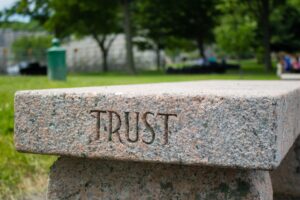Trust is built on evidence, not promises
Trust is the foundation of relationship building. It is fundamental in creating a supportive network or productive workplace. Trust is built when there is consistent evidence supporting mutual values and/or goals. Without trust, every word and action must be questioned and analyzed before the next move is made. Why in the world would anyone want to waste the time and energy to question every single thing that they are told? Or further still, why would anyone blindly trust wha t they hear when there has been zero history of evidence shown to substantiate any of it? Trust is built on evidence, not promises.
t they hear when there has been zero history of evidence shown to substantiate any of it? Trust is built on evidence, not promises.
Building trust requires listening, open communication and action.
Avoidance or silence is not an effective method for gaining trust. Ducking difficult conversations will not help resolve difficult issues, nor will it reinforce a fragile relationship. Pushing your agenda on others without considering all relevant information can also lead to mistrust. Building trust requires listening, open communication and action. Trust requires showing up, participating and/or weighing in. Saying nothing does nothing. And more importantly, to establish trust, you have to demonstrate the willingness to hear someone else’s perspective.
Whether it’s from the stress of COVID-19, financial concerns or the nation’s current politics, in general, people appear to be behaving differently than they might under other conditions. (Although, in some cases, some behavior is only an exaggerated version of what has always been and we need to recognize that, too.) People are experiencing an inability to focus, difficulty in forming thoughts or contributing to effective communication, and shortened tempers. Whatever the cause of these (hopefully temporary) unsettling conditions, we have to remember that our behavior will impact others. We have to also consider that the more we deviate from the behavior others have come to expect us to demonstrate, the more we break trust.
To help leaders lead, we have to speak up.
The world is a bit upside down. Our workplaces, for those fortunate enough to still have one, are in constant turmoil. Assumptions need to be laid to rest, and we all need to step up and do what we can to create solutions for the issues we are facing. No one person can do it alone, but the body of people in position to lead the way must be trusted before we can gain momentum. To get there, we all have to contribute and be able to articulate our expectations. We also have to be willing to take responsibility for our own contribution or lack thereof. To help leaders lead, we have to speak up. In turn, they have to demonstrate that they trust us as well.
Expecting something positive to happen because you have never known anything different could be naiveté or perhaps it comes from privilege. (That’s a separate, albeit related conversation.) Relying on someone else to deliver an assumed reward that ultimately doesn’t appear may cause you to feel like a victim. But not getting what you have expected is an outcome that can happen for many reasons. It could be that you assumed you would get a job offer, raise, recognition or promotion just because you have always been rewarded in this way. Or, you only took what you thought were the required steps and didn’t investigate further to know what was really needed. Perhaps you never really analyzed your own efforts in facilitating your expectations or achieving your goals. Maybe it’s time. Evaluate the last time you were disappointed:
- Was it because you trusted a situation that you assumed should be?
- Did you fail to state your expectations so that you could have determined whether they were accurate or possible?
- Have you done everything you needed to do to set the stage for others to trust you?
- Were your expectations unrealistic based on a bigger picture you failed to take into account?
In addition to having unrealistic expectations about rewards, expecting someone else to change a behavior to suit only your needs vs. recognizing what would really be best for the greater good can lead to trouble. If you think about it and find that you can change something about yourself and are able to contribute to a different outcome, then choose to do it. (There are many people who are far worse off than anyone reading this message who can’t expect anything different and do not have a choice.) Establishing yourself as a person of your word who will consider others’ needs and what is best for the greater good will build the trusting relationships that really can help you get where you want to be.
We really ARE in this together. It is time to come together and think outside of our own needs. I ask all of you to recognize how important it is to show others that you are “trustworthy,” especially when you expect the same of them. Coming into the last leg of 2020, now is a good time to examine unrealistic expectations and unproductive behaviors and make a change.





